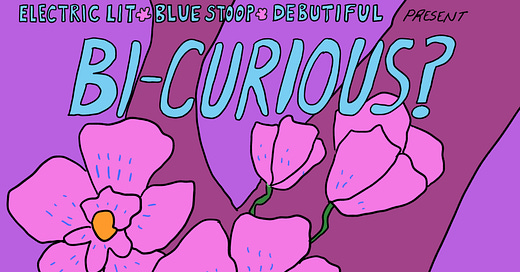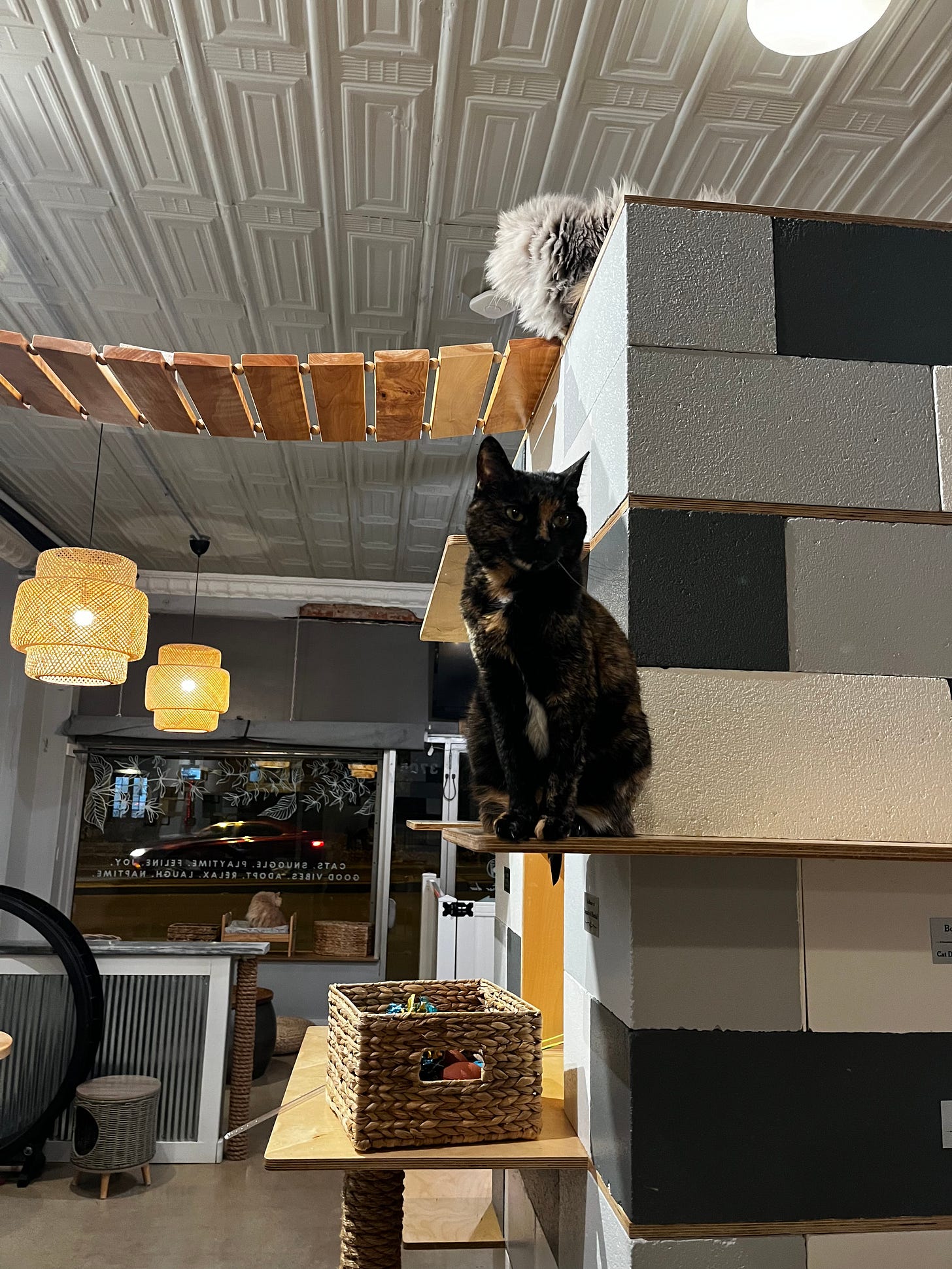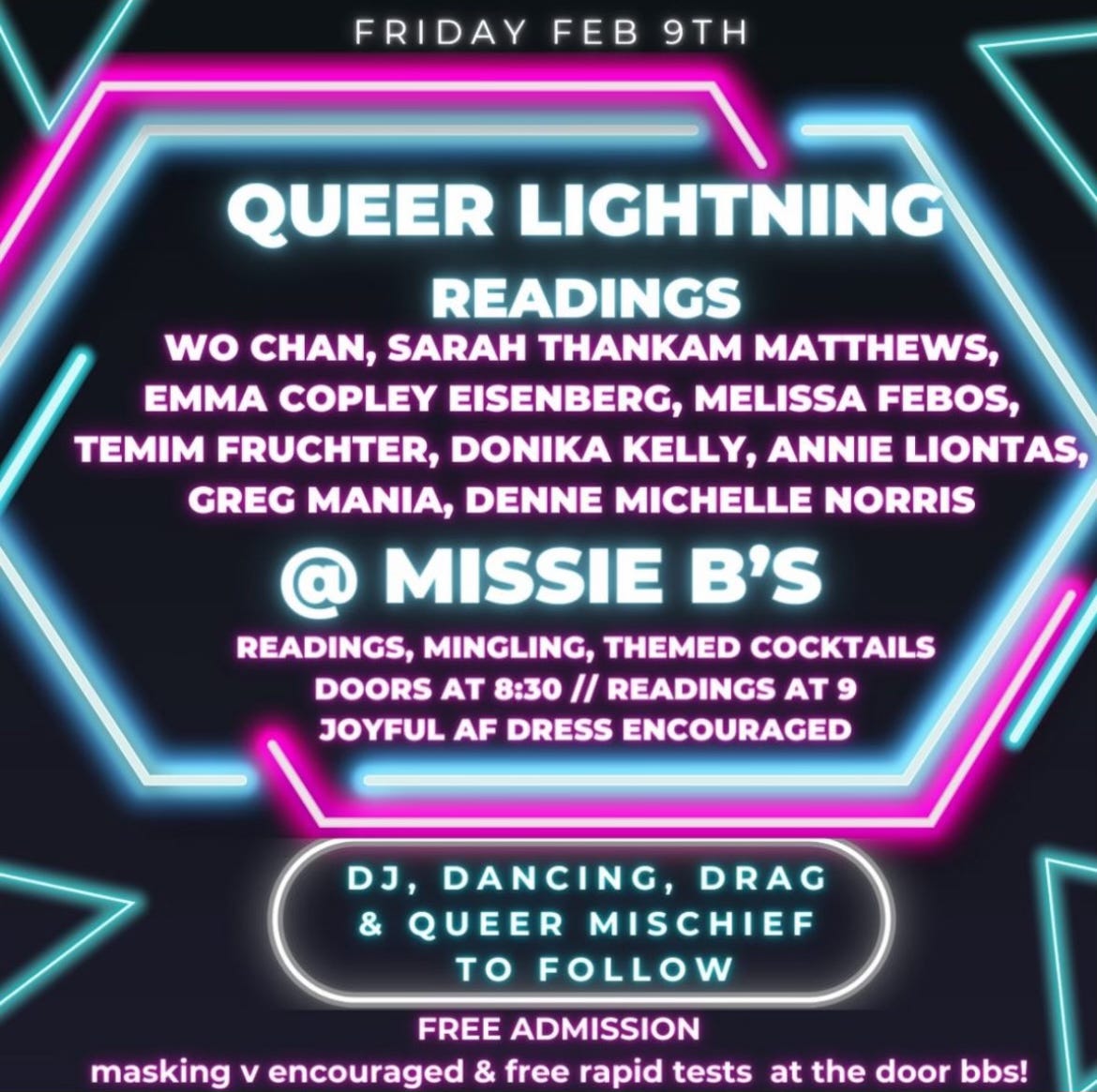This year’s AWP gave me big feelings. The conference, which has a tendency to leave me emptied out of sensation and circa 87% dead, did the opposite this year, offering a truly bonkers number of moments that reminded me how very alive I am and how wildly alive it is to be a part of this awful, essential industry we call “books.” It’s not all good; it’s mostly bad in fact. But figuring out how to remain human nonetheless is on my mind, and has, against all odds, felt possible these past few days.
For the blissfully uninitiated, AWP is when literal thousands of writers and bookish folk descend upon some unsuspecting American city—it was Kansas City this year—for five days of panels, book fair tabling, parties in bars, and readings. In practice, this means that one is usually either wandering through a fluorescently lit and brightly-carpeted convention center for hours in a listless search for food or water as if through a barren desert, or rushing from one cute meetup with a long lost writer friend to another before collapsing in the bed of a sterile hotel room. AWP would make a good sequel premise to the cruise in “A Supposedly Fun Thing I’ll Never Do Again.”
(I fully acknowledge also that the paid cost of going to AWP starts at $250 not including travel, lodging or meals; even to go to AWP in the first place means having a certain amount of privilege — either in the form of dollars in your bank account, enrollment in or employment by a college or university, or affiliation with a publication or publishing house. I also acknowledge here that AWP has consistently been on the wrong side of history, as when they went ahead and held the annual conference anyway in 2020 in San Antonio despite COVID’s rampant spread, as when they continue not to require attendees to be vaccinated or wear masks, and as when, this year, they issued a totally hostile and unnecessary response to a mass email RAWI (Radius of Arab-American Writers) sent to panel moderators inviting them to acknowledge the ongoing genocide in Gaza).
AWP can be a clusterfuck of careerism, not to mention status and popularity jostling, liable to kick up any and all feelings about how “well” you are doing as a writer—or publisher, magazine, MFA program or editor, I imagine. Some people are asked to give paid, conference-sponsored readings and keynotes to hundreds while others bop around reading their work to a dozen folks for free. Some people are asked to be on a million panels or bar readings (which, for the record is also unpaid labor), while some people are asked to be on none. Some people are asking the questions and some people are answering them. Some people know everyone in the hotel bar—where the party always ends—and some people know no one. Some people are buying the drinks and some people are drinking them. Some people are asked to go first or last at an offsite reading, knowing full well that most attendees will not be there right at the start or will only stand around on their feet for so long.
You will have a feeling about some writer, and the feeling is wanting to be close, either because you loved their book or because you love them, which may be because you loved their book and now you feel you know them. Some people will have this feeling about you in turn, people you do not know and do not love. You take Uber after Uber to see a person read or speak who sort of does not remember you exist. This is all a normal part of the process I will call “AWP longing.” Usually these longings do not align; very rare is it that you long for someone and the person also longs for you, but occasionally this does happen and it is the *best* feeling. But usually, in AWP as in life, the longing does not move equally; someone’s longing is unrequited.
So here is what I did this year to stay human at AWP that worked and didn’t work:
I attended a gorgeous talk between hero Susan Choi, author of among many others, Trust Exercise, and author of my favorite book of 2022, All This Could Be Different,
. They each spoke of how these life changing books were born, unexpectedly, out of the grief of having to abandon another novel that wasn’t working. They spoke of how “coming of age” novels both necessarily probe the experience of being young and don’t, as “we come of age over and over and over again.” I had a little cry whilst listening.I went down a Goodreads spiral one night. For some strange reason, perhaps see the list above of how and why AWP can mess with you, I became gripped in the night by the conviction that I had made a grave error in Housemates. The novel makes a risky choice in its narration, opting not exactly for a traditional first or traditional third, and Goodreads folk are, so far, not into it. Alas! What a fool I was! Not to take this risk, but to give two hours of my wild and precious life over to that hell site. “Goodreads tends to penalize books that take creative risks for precisely these risks,” says my wise friend Hilary Leichter. Don’t cry for me, I’ve now blocked the site on my computer and phone.
Cried about death and my dad dying at the bar whilst discussing a friend’s idea for a new literary magazine about death. Because why not!
Read from Housemates at…a cat cafe! About 60 glorious cat lovers assembled to hear words and then paraded next door to pet the cats. Best AWP reading ever.
Heard my friend Annie Liontas read not once, not twice, but three times from their glorious, knockout memoir in essays, Sex With a Brain Injury, which just came out from Scribner. (Here’s a convo between Annie and I about the book over at Electric Literature). If you or someone you know has had a traumatic brain injury, if you’re queer or nonbinary, if you have a body and want to be made aware of how strange and powerful it is, this book is for you. Their third and final reading made me cry (is crying the theme of this year’s AWP? yes, yes it is) not least because it was in front of a packed house of raucous and empathetic queers holding them in the light.
Tried and failed, at least five times, to describe AWP to Kansas City Uber drivers. If I’ve ever been in danger of taking what I do too seriously, this quickly disabused me of that notion. “Are there any writer celebrities at this conference?” asked one Uber driver, to which, after much thought, I had to answer in the negative. “What does literary writing mean?” another driver asked, to which I had no answer. (I later heard another friend answered this with the truly iconic phrase, “a little elitist?”)
Didn’t do ANYTHING literary on Saturday. Instead, I ate pastries and barbecue and wandered around an arts supply store. Then I went outside and exposed my shriveled East Coast crone body to the sun and watched the clouds moving fast across the sky. I thought about how lucky I am to have a life that puts me in contact with so much beauty.
Toppings
I can’t recommend
’s Unshrinking: How to Face Fatphobia enough. She’s a philosopher and a fat person and the book splendidly combines trenchant cultural observation and memoir. It’s the much needed synthesis of current thinking on how fatness does not mean unhealthy, how fatness intersects with misogyny and anti-blackness and more that we’ve all been waiting for.I also read Piglet by Lottie Hazel this month. It’s a novel out February 27, being billed as “an examination of women's often complicated relationship with food and a celebration of the messes life sometimes makes for us.” I was hesitant, since it’s written by a thin white woman, but I was mostly pleasantly surprised on the food writing front. It didn’t read as fatphobic to me, but I found it to more use food and bodies as a metaphor for ideas about “mess” and “hunger” than it really examined these physical phenomenon.
I’ve just received galleys of Emmeline Clein’s Dead Weight: Essays on Hunger and Harm (February 27) and Emma Specter’s More Please: On Food, Fat, Bingeing, Longing, and the Lust for ‘Enough’ (July 9) and am v excited to dig into both.
Book Scoop
If you want to get Housemates NOW and for FREE you can enter this lil Goodreads giveaway.
Flummoxed that Housemates got a starred review from Kirkus. They are usually so grumpy. Here’s a highlight: “Shifting mores around sexuality and gender, the complicated demands of social justice movements, how we deal with bad people who create good art, and the difference between recording and actually seeing are just some of the topics Eisenberg lays out before setting her Gen Z protagonists loose to explore them…Eisenberg works through the issues she sets before the reader at the beginning of her novel with love and nuance. Or maybe it’s better to say that she lets her main characters fumble along in a world in which these issues matter. If that sounds pedantic or prescriptive, it’s not. Eisenberg has a poet’s eye for truth, and her prose is gorgeously precise and empathetic while remaining cleareyed.” Eek.
Housemates remains pre-order able from Bookshop.org, which supports independent bookstores.
Until next month! Yours,
Emma






Love the term AWP longing. Felt it moderately this year 😅
This year was my first AWP and I had big feelings as well! I felt extremely privileged to be there as well but was overwhelmed by the largeness of everything. This came as a surprise to me because I have been to other conferences and events and never had this issue! It is hard to describe to Lyft/Uber drivers....our threesome was in a conversation about writer vs author which confused him and us by the time we got to our reading location! LOL
I am still processing the time I had there and trying to write about it.
Thank you for this post!